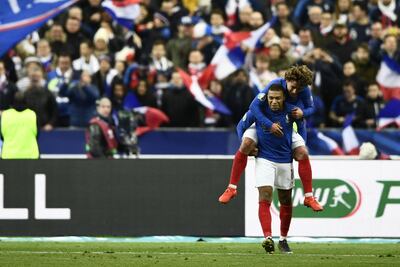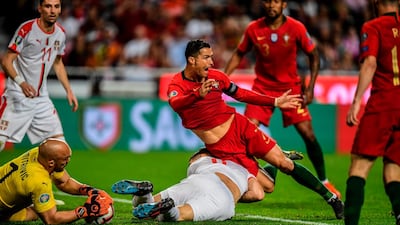There is no single formula for winning a major title. Some are achieved with flair, some with phlegmatic resistance.
What champions seldom do, though, is accumulate title after title without subtle changes of style and habits. Predictable title-winners tend to be title winners just once.
As the starter’s gun sounded for the next European Championships this week, two reigning champions were scrutinised for signs of how they are moving on, developing new strengths.
One the one hand, France, world champions, showing free-flowing good form. On the other, there is Portugal, whose defence of their continental crown has begun with many echos of the way they won Euro 2016.
Portugal scored just one goal in picking up two draws in qualifying Group B. No great shock in that when you recall the sort of modest start the Portuguese made to what was to become the most successful tournament in the country’s history three years ago.
Then, Fernando Santos’s team climbed all the way to the Euro 2016 semi-finals without winning a single fixture within 90 minutes.
Either side of this weekend, they drew 0-0 to Ukraine and 1-1 with Serbia, both home fixtures at a supportive Estadio da Luz. Both times they had Cristiano Ronaldo in the starting line-up, the captain and totem having returned after seven months resting from international engagements.
Ronaldo is his country’s greatest goalscorer, but his 85 strikes for his country have been spread over some frustratingly lean periods, and he is long accustomed to qualifying campaigns starting slowly and sometimes going to the wire.
This one is not yet a cliffhanger, although the sight of Portugal stuck in third place, beneath Luxembourg, in the Group B table will raise a few eyebrows. But what the Portuguese know is that patience and doggedness can work.
Back in 2016 they stalemated their way to the last four of the tournament without being able to beat Iceland, Austria or Hungary in the group phase. Come the final, they lost Ronaldo to injury after 25 minutes, and then beat France without their figurehead striker thanks to long-range goal from an unlikely hero, the substitute Eder.
On Monday night, against Serbia, a similar storyline: Ronaldo went off with muscle strain after 28 minutes. Portugal then earned their point via a long-range goal from an unexpected source, Danilo, the midfielder, with a scorching, rising drive.

Supporters of France are more privileged in terms of guaranteed entertainment. The world champions have spent the past five days elaborating the routines that propelled them through the later stages of last summer’s World Cup.
They won both their first two Euro 2020 qualifiers, against Moldova and at home to Iceland, scored four goals in each victory, just as they scored four against Argentina in the first knockout round in Russia last summer and four in the final against Croatia.
More deja vus: There were goals from crosses from a central defender in each game, Rafa Varane’s against Moldova, Samuel Umtiti’s against Iceland, recalling the crucial strikes by Varane against Uruguay and Umtiti against Belgium in the World Cup quarter- and semi-final.
Kylian Mbappe, speeding away from his markers, scored in both qualifiers; Paul Pogba delivered one of the finest defence-beating passes of the week to set up Antoine Griezmann’s opener in Moldova.
Nothing especially novel in any of those manoeuvres, and stronger sides than Moldova and Iceland will in the next 14 months combat France’s many fortes more effectively. But there is a clear and present promise in this young France squad of room to develop further.
“I am most pleased with the quality of our attacking football,” said Didier Deschamps, a manager ready to discard some of his own more cautious instincts.


